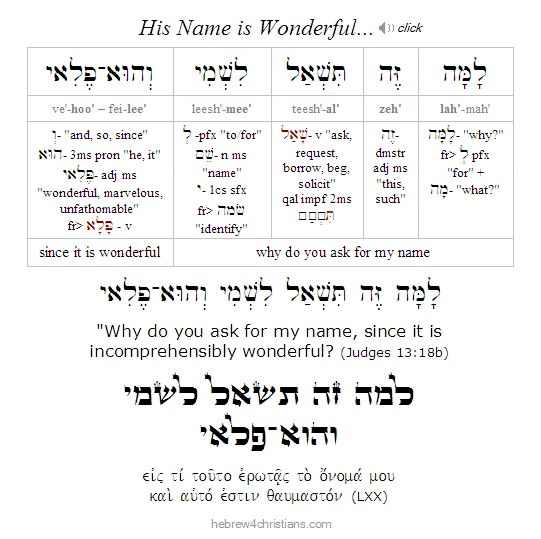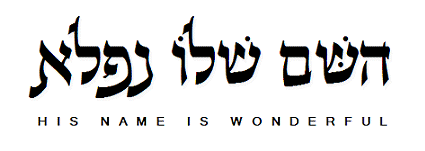|
Every once in awhile I get a text or email from someone who wants to correct or challenge my understanding regarding the Name of the LORD. Usually I am usually told that "YHVH" (יהוה) should be pronounced some particular way or another, and some even go so far as to claim that if I don't pronounce the Name according to some preferred transliteration, I am literally a "lost soul." Oy vey... This sort of "holier-than-thou" thinking really angers me, since it is divisive and is based on a deadly mixture of ignorance and pride.
This week's Torah portion (the first of the Book of Exodus) is called Shemot (שְׁמוֹת, "names") because it begins with a list of the "names" of the descendants of Jacob who came to dwell in the land of Goshen: וְאֵלֶּה שְׁמוֹת בְּנֵי יִשְׂרָאֵל הַבָּאִים מִצְרָיְמָה / "These are the names of the sons of Israel who came to Egypt" (Exod. 1:1). Now while it's true that the Torah here lists the various names of the sons of Jacob, this portion of Torah more importantly refers the Names (plural) of the LORD God of Israel Himself.
To see this, let's consider the central story of this portion of Torah, namely, the commissioning of Moses at the Burning Bush (see Exod. 3:1-20). Note that the Torah states that it was the Angel of the LORD (i.e., Malakh Adonai: מַלְאַךְ יהוה) who appeared to Moses בְּלַבַּת־אֵשׁ מִתּוֹךְ הַסְּנֶה / "in a flame of fire out of the midst of a bush" (Exod. 3:1-2). But then the Torah goes on to say that the LORD (יהוה) saw Moses drawing near to the bush while God (i.e., Elohim: אֱלהִים) called out to him. God (i.e., Elohim) then commanded Moses to remove his sandals and identified Himself as the "God of Abraham (i.e., Elohei Avraham: אֱלהֵי אַבְרָהָם), the God of Isaac (i.e., Elohei Yitzchak: אֱלהֵי יִצְחָק), and the God of Jacob (i.e., Elohei Ya'akov: אֱלהֵי יעֲקב)." In this short and dramatic account we have several Names of God presented - the Angel of the LORD, the LORD, God (Elohim), and the "God of Abraham, the God of Isaac, and the God of Jacob" - all of which refer to the One true God!
 |
When God commissioned Moses to be His shaliach (שָלִיחַ) - His emissary - to go before Pharaoh and lead the children of Israel back to the Promised Land, he objected that he was unfit for the task. He protested that he was kevad peh - "heavy of mouth" and kevad lashon, "heavy of tongue," and therefore unable to speak on behalf of the LORD (Exod. 4:10). God reminded him that He was the Creator of the mouth: "Who makes him mute, or deaf, or seeing, or blind? Is it not I, the LORD?" (Exod. 4:11).
Perhaps it was because Moses was "heavy of mouth" that he continued to object to God's decision to send him to to Egypt. After all, what would Moses say if he were asked what God's Name was? Perhaps Moses couldn't speak well enough to properly enunciate the Name? It is revealing to understand the LORD's reply: אֶהְיֶה אֲשֶׁר אֶהְיֶה / "Ehyeh Asher Ehyeh ('I will be what I will be'); and He said, "Say this to the people of Israel, 'I AM (אֶהְיֶה) has sent me to you.'" Then God (i.e., אֱלהִים) went on to "spell it out" for Moses: "Say this to the people of Israel, 'The LORD (יהוה), [namely] the God of your fathers, [namely] the God of Abraham (אֱלהֵי אַבְרָהָם), [namely] the God of Isaac (אֱלהֵי יִצְחָק), and [namely] the God of Jacob (אֱלהֵי יעֲקב), has sent me to you.' This is my name forever (זֶה־שְּׁמִי לְעלָם), and thus I am to be remembered throughout all generations" (Exod. 3:14-15).
Now I included the Hebrew text here to make it explicit that the distinct Names of God in this passage (i.e., יהוה, אֱלהִים, מַלְאַךְ יהוה, and so on) all refer to the One true LORD God of Israel, Maker of Heaven and earth. Indeed, the Torah makes it clear that the Name of the LORD YHVH (יהוה) is associated with the phrase ehyeh asher ehyeh (rendered as "I AM THAT I AM" in the KJV), which derives from the Qal imperfect first person form of this verb hayah (הָיָה): "I will be." In other words, there is a direct connection between the Name YHVH and Being and Reality itself. YHVH is the Source of all being and has being inherent in Himself (i.e., He is necessary Being). Everything else is contingent being that derives existence from Him. The name YHVH also bespeaks the utter transcendence of God. In Himself, God is beyond all "predications" or attributes of language: He is the Source and Foundation of all possibility of utterance and thus is beyond all definite descriptions.
In Jewish thought, the numerous names of God revealed in Scripture (Elohim, Shaddai, Adonai, the King of Israel, etc.) are thought to reveal different aspects or attributes of God's character and will to us. They function as "short hand" for descriptions of His essence - revelations of the hidden mystery and glory of the LORD. Since taking the name of the LORD "in vain" is one of the Ten Commandments, certain conventions are used to restrict the use of any of the Names of God. These conventions derive from Jewish law (halachah) that requires that secondary rules (גְּזֵרוֹת - "fences") be placed around a primary law to reduce the chance that the main law will be violated. For example, it is common practice to refer to God as "Hashem" (the Name) or to deliberately alter the sound or spelling of the name (i.e., "Adonai"). Mystics referred to the name YHVH as "shem havayah" (שם הוויה), the Name of Being itself, so formed by transposing the letters of the Tetragrammaton.
According to Maimonides, one of the greatest Jewish theologians of the Middle Ages, all the various names and titles of God – with the possible exception of YHVH (יהוה) – are appellations that denote the Divine attributes. There is only one God revealed within Scripture and the multiplicity of names refers to different aspects of revelation rather than supposing that there is a multiplicity of deities. This idea also finds expression in the designation of God as Ein Sof (אֵין סוֹף), a theological term used to express that the essence of God is "without end" or "infinite." The revealed names of God therefore all represent some aspect of the divine nature to us in language that we can apprehend.
In the modern philosophy of language there has been much discussion about how names refer to objects. Are names arbitrary social conventions? Are they "shorthand" for a set of descriptions? Are they mental constructs or do they reveal something about reality itself?
While Gottob Frege (1848-1925) believed that the meaning (or "sense") of a proper name is derived from descriptions associated with it, Saul Kripke (1940-2022) said that names are "rigid designators" with a direct reference, and the meaning of a name is simply the object it refers to, not to a set of descriptions. Theologically this would mean that, for Frege, the meaning of the name YHVH is derived from various ways of describing the name, inductively gathering applications to form a conceptual idea of YHVH, whereas for Kripke, the meaning of the name YHVH is encountered directly in its uniqueness, and that other names may serve as descriptors but the underlying essence remains whatever it is.
Kripke's thinking more or less follows the traditional Jewish view that the numerous names of YHVH revealed in Scripture (Elohim, Shaddai, Adonai, the King of Israel, etc.) all reveal different aspects or attributes of YHVH's character and will to us. They function as "short hand" for descriptions of His essence - revelations of the hidden mystery and glory of the LORD. Since taking the name of the LORD "in vain" is one of the Ten Commandments, certain conventions are used to restrict the use of any of the Names of God. These conventions derive from Jewish law (halachah) that requires that secondary rules (גְּזֵרוֹת - "fences") be placed around a primary law to reduce the chance that the main law will be violated. For example, it is common practice to refer to God as "Hashem" (the Name) or to deliberately alter the sound or spelling by using circumlocution.
Some people seem to be obsessed with finding out how to pronounce or utter the Sacred Name of the LORD (i.e., יהוה), though Jewish tradition maintains that the Divine Name is entirely ineffable and therefore intrinsically mysterious. Indeed, attaching a name to something "labels" it and claims authority over it (e.g., when David put his name over a conquered city). Since the LORD is utterly unique, without rival, the Creator and LORD who is answerable to no one, He cannot be named. The Jewish mystics say (surely as a form of hyperbole) that the proper Name of the LORD is all the letters of the Torah sounded at once -- without interruption. This is called the "304,805 letter Name of God." That is, string together all 304,805 letters of the Torah - from the first letter of Bereshit (Bet) through the last letter of Devarim (Lamed) - and "read" this as a single "Word." Of course the point here is that no one can do this. Indeed, the Angel of the LORD asks, "Why do you ask my name, seeing it is incomprehensibly wonderful?" (Judges 13:18).
Hebrew Lesson
Judges 13:18b Hebrew reading (and podcast):
 |
There are quite literally hundreds of different names, titles, metaphors, similes, allegories, and allusions given in the Hebrew Scriptures that refer to the one true God. Though YHVH is God's special Name, it is clearly a play on the verb "to be" (hayah). We do not "invoke" the Name like a magician might utter a "divine spell." God is near to us -- He's in the wind, in the heavens and earth, as close to you as your own heart (Deut. 30:14; Rom. 10:8). The really hard part is to love and obey the LORD -- not to learn how to say His incomprehensible Name. Indeed, what good would it be to know how to properly pronounce the Sacred Name of the LORD if you do not love and obey Him? If you want to call upon the Name of the LORD, seek first His kingdom and His righteousness (Matt. 6:33). Learn to know Him as your Abba...
There is the "sign" and the "signified," the name and the reference. The Hebrew word for "name" (שֵׁם) refers to more than sound made with the lips, but rather refers to truly understanding someone's reputation, character, and so on. The Name of the LORD (שֵׁם יהוה) represents the LORD God of Israel's glory, reputation, character, and mighty deeds of salvation for His people. Knowing His Name means understanding His glory as the Savior of the world (מוֹשִׁיעַ הָעוֹלָם). Indeed, personally knowing the Name of the LORD means inwardly accepting that He has valliantly acted on your behalf by saving you from the cruel bondage of your shame and sins through Yeshua, the revealed Angel of the LORD. In short, knowing who Yeshua is and what He has done for you is to know the Name of the LORD (Rom. 10:13; Phil. 2:10-11). You simply cannot know the "Name of the LORD" without knowing the Name of His Son (John 5:23; Prov. 30:4; Heb. 1:1-2).
 |
Postscript: The greater significance of all this is to indicate that the "Name of the LORD" is none other than Yeshua (or Jesus). Yeshua = YHVH. Compare Isa. 45:22-23 with Phil. 2:10. The idea of "Name" means more than mere phonetics; it has to do with the deeds, acts, power, reputation, and glory of God. Those who do not honor the Son do not honor the Father who sent Him (John 5:23). Denigrating Yeshua by even hinting that He is less than God Almighty is to desecrate the Name of God and engage in chilull Hashem (חילול השם).
|






